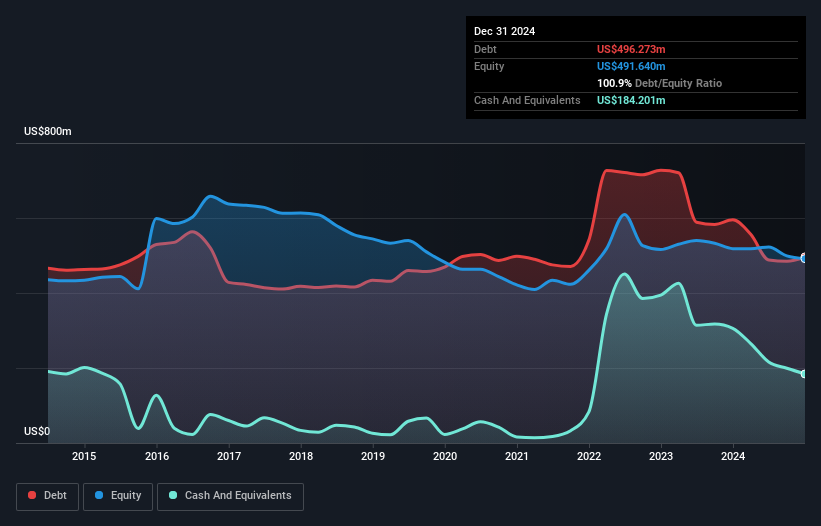
Legendary fund manager Li Lu (who Charlie Munger backed) once said, 'The biggest investment risk is not the volatility of prices, but whether you will suffer a permanent loss of capital.' So it might be obvious that you need to consider debt, when you think about how risky any given stock is, because too much debt can sink a company. As with many other companies LSB Industries, Inc. (NYSE:LXU) makes use of debt. But is this debt a concern to shareholders?
When Is Debt Dangerous?
Debt is a tool to help businesses grow, but if a business is incapable of paying off its lenders, then it exists at their mercy. In the worst case scenario, a company can go bankrupt if it cannot pay its creditors. However, a more usual (but still expensive) situation is where a company must dilute shareholders at a cheap share price simply to get debt under control. Of course, debt can be an important tool in businesses, particularly capital heavy businesses. When we examine debt levels, we first consider both cash and debt levels, together.
What Is LSB Industries's Net Debt?
You can click the graphic below for the historical numbers, but it shows that LSB Industries had US$496.3m of debt in December 2024, down from US$595.1m, one year before. However, it does have US$184.2m in cash offsetting this, leading to net debt of about US$312.1m.

How Strong Is LSB Industries' Balance Sheet?
We can see from the most recent balance sheet that LSB Industries had liabilities of US$135.6m falling due within a year, and liabilities of US$559.9m due beyond that. On the other hand, it had cash of US$184.2m and US$38.8m worth of receivables due within a year. So its liabilities outweigh the sum of its cash and (near-term) receivables by US$472.6m.
When you consider that this deficiency exceeds the company's US$471.3m market capitalization, you might well be inclined to review the balance sheet intently. Hypothetically, extremely heavy dilution would be required if the company were forced to pay down its liabilities by raising capital at the current share price. The balance sheet is clearly the area to focus on when you are analysing debt. But ultimately the future profitability of the business will decide if LSB Industries can strengthen its balance sheet over time. So if you want to see what the professionals think, you might find this free report on analyst profit forecasts to be interesting.
See our latest analysis for LSB Industries
In the last year LSB Industries had a loss before interest and tax, and actually shrunk its revenue by 12%, to US$522m. We would much prefer see growth.
Caveat Emptor
Not only did LSB Industries's revenue slip over the last twelve months, but it also produced negative earnings before interest and tax (EBIT). To be specific the EBIT loss came in at US$5.5m. Considering that alongside the liabilities mentioned above make us nervous about the company. It would need to improve its operations quickly for us to be interested in it. Not least because it burned through US$5.7m in negative free cash flow over the last year. That means it's on the risky side of things. For riskier companies like LSB Industries I always like to keep an eye on whether insiders are buying or selling. So click here if you want to find out for yourself .
If you're interested in investing in businesses that can grow profits without the burden of debt, then check out this free list of growing businesses that have net cash on the balance sheet.
Have feedback on this article? Concerned about the content? Get in touch with us directly. Alternatively, email editorial-team (at) simplywallst.com.
This article by Simply Wall St is general in nature. We provide commentary based on historical data and analyst forecasts only using an unbiased methodology and our articles are not intended to be financial advice. It does not constitute a recommendation to buy or sell any stock, and does not take account of your objectives, or your financial situation. We aim to bring you long-term focused analysis driven by fundamental data. Note that our analysis may not factor in the latest price-sensitive company announcements or qualitative material. Simply Wall St has no position in any stocks mentioned.